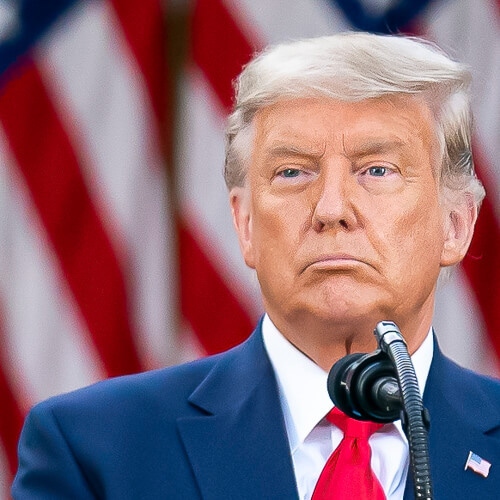The Trump administration appears poised to add Shanghai's Semiconductor Manufacturing International Corp to a list of companies linked to China's military.

In its final weeks, the Trump administration is moving to place China's largest chipmaker on a blacklist of companies linked to China's military.
By adding Shanghai-based chipmaker Semiconductor Manufacturing International Corp (SMIC) to the blacklist, Trump appears to be attempting to box the incoming Biden administration into a more hardline position on China.
The move, which would be published in the Federal Register, would have the effect of prohibiting US investors from buying shares in the company starting later in 2021.
Figure 1:  Parting shots: Trump may be on the way out – but he's going to make sure China comes with him.
Parting shots: Trump may be on the way out – but he's going to make sure China comes with him.
(Source: White House)
Earlier in November, the White House issued an executive order saying US persons would have until November 11, 2021 to divest themselves of shares in "any Communist Chinese military company".
The Trump administration intends to add SMIC to this list of military companies, which currently contains 31 businesses, including telecom manufacturer China Electronics Corporation and China Communications Construction Company, an engineering company involved with many Belt and Road Initiative projects.
No chips ahoy
US companies Qualcomm, Broadcom and Texas Instruments each purchase semiconductors from the Chinese foundry, which makes up 4% of the world semiconductor market according to one estimate.
SMIC, in a statement Monday to China's state-owned Global Times and other media, repeated earlier statements from recent months that it has "no relationship with the Chinese military and does not manufacture for any military end-users or end-uses."
In July, SMIC, which had already been listed on the Hong Kong stock exchange, raised $7.6 billion in a secondary IPO on the Shanghai's exchange, with sovereign wealth funds from Singapore and Abu Dhabi investing particularly heavily.
The chipmaker had delisted from the New York Stock Exchange in May 2019, as US-Chinese economic relations began to grow frosty.
However, US sanctions on Huawei have meant SMIC could not sell semiconductors to its biggest chip customer without a license from the US government, which it has applied for but not yet received.
SMIC also relies on US companies for equipment and supplies. In an earnings conference call on November 11, Joint Chief Executive Zhao Haijun said his company would not face immediate supply-chain issues in the short term.
In the longer term, the answer may be different. "But in the long run, you know that certain types of material, especially for the consumables, cannot be stored for a very long time," he added.
Making a list, checking it twice
In drawing up a list of "Chinese Communist military companies," the Trump administration is relying on a bit of law in Section 1237 of the National Defense Authorization Act for Fiscal Year 1999.
That section says the US Secretary of Defense will compile a list of "Chinese Communist military companies" (CCMCs), defined as a company "i) owned or controlled by the People's Liberation Army, and (ii) engaged in providing commercial services, manufacturing, producing or exporting."
The law was largely forgotten about until now, and if any Secretary of Defense ever made such a list, there's no indication it was ever used for anything.
Want to know more about security? Check out our dedicated security channel here on Light Reading.
Also, under the 1999 NDAA, "there was no legal consequence for being listed as a CCMC," notes the US law firm Skadden Arps in a research note.
Trump's Executive Order 13959 from November 12 attempts to put teeth in the list, by prohibiting US investors from transacting in publicly traded securities of companies on the list, or other securities derived from them or that give investment exposure to them.
But investment activity is all that's curtailed, observe the research note's authors.
The executive order actually does nothing at all to more broadly restrict commercial dealings with the companies. You could still buy their products, and sell to them, under the Executive Order.
You could even make investment transactions in non-publicly traded securities of companies on the list, so long as they weren't traded on an exchange.
Whether the Executive Order was actually meant to have such limited reach, or if its language is different from what the Oval Office meant, like so much about the waning Trump administration is anybody's guess.
Related posts:
— Pádraig Belton, contributing editor, special to Light Reading
Read more about:
AsiaAbout the Author(s)
You May Also Like











